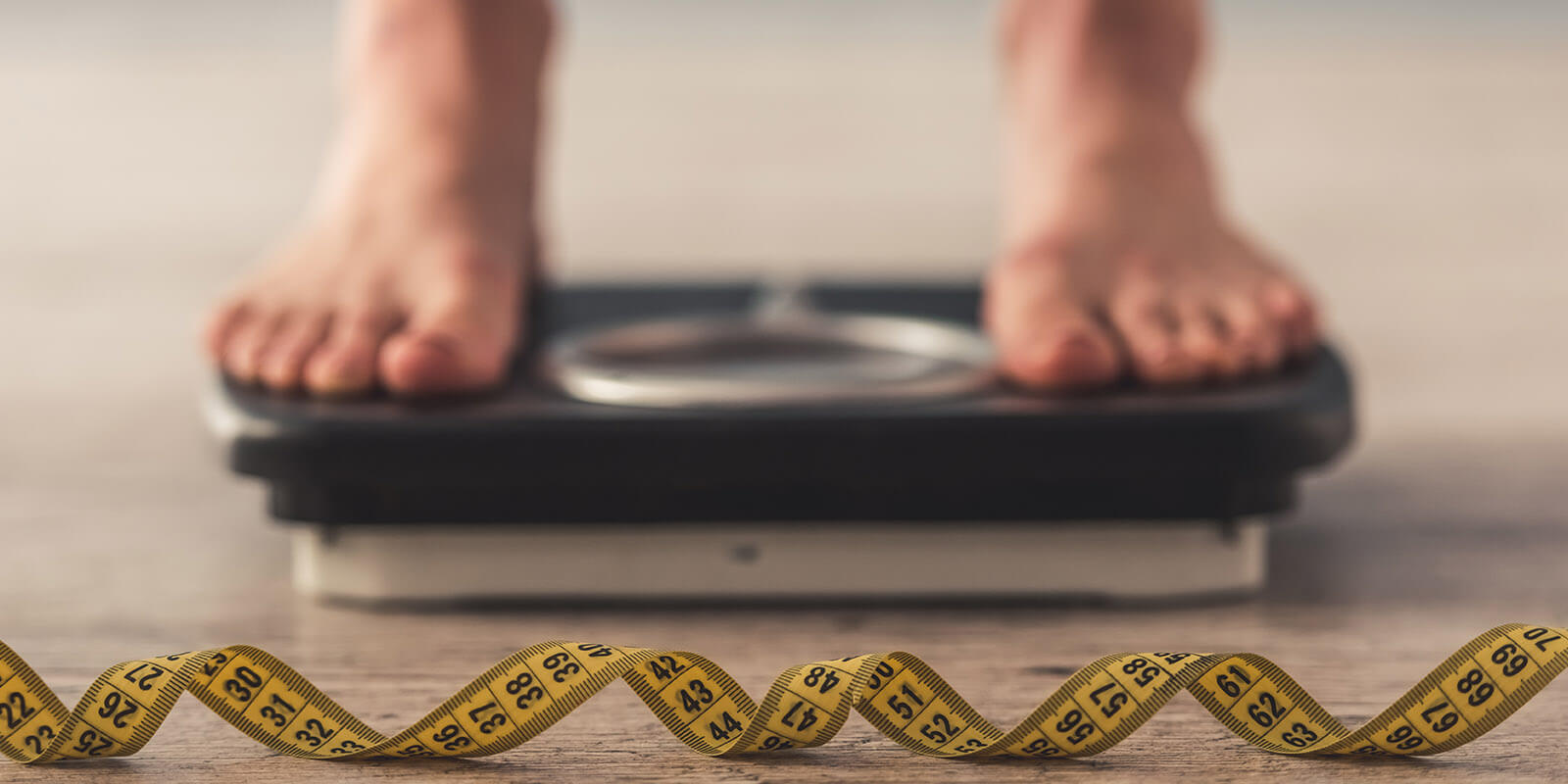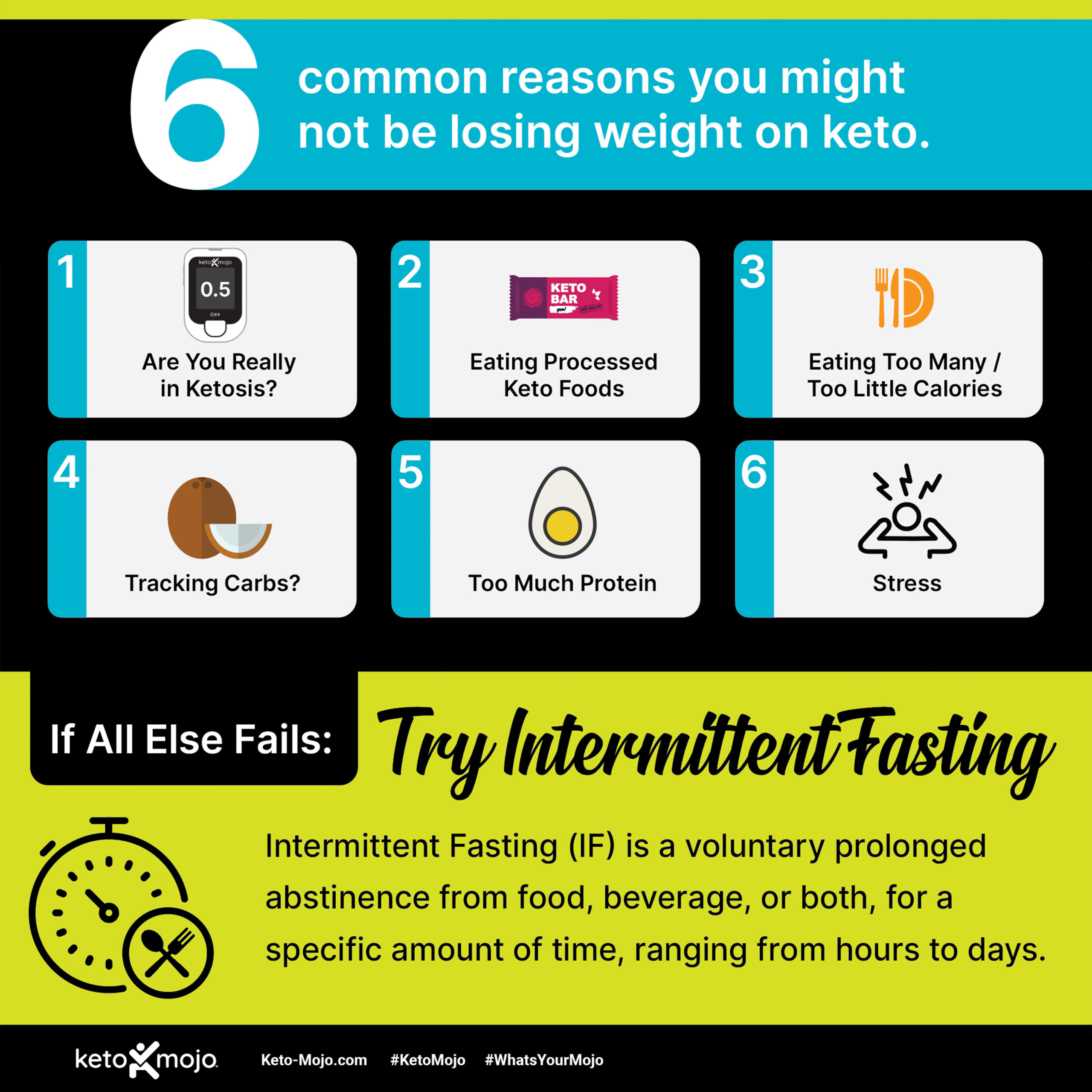UPDATED BY FRANZISKA SPRITZLER, RD, CDCES
Although a ketogenic lifestyle can provide many health benefits, one of the main reasons people choose this approach is for weight loss. So, if you’re following a keto diet to lose weight and the scale isn’t budging, it can certainly be frustrating. But don’t despair. We’ve rounded up the most common reasons you might not be losing weight on keto and put together practical solutions to help you move forward.
Are You in Ketosis?
Before we dig into other possible influences, let’s make sure you are actually in ketosis. You may think you are, but if you aren’t truly in ketosis, you won’t reap the benefits from it, including weight loss. The best way to find out is to check your blood ketones and blood sugar and make sure your numbers are in line with ketosis.
If you know you’re in ketosis and you’re still not losing weight, here are some other things to consider.
Are Processed Keto Foods Kicking You Out of Ketosis?
As keto has grown in popularity, so have the food choices. On the one hand, it’s good to have options. But on the other, there are some not-so-healthy options available, like misleading “keto” snacks and desserts. These convenience foods can affect your ability to stay in ketosis or lose weight for two simple reasons:
First, many “keto” processed foods lack the nutrients we need. When you fill up on these foods, your body may not get enough of the essential vitamins and minerals it needs for optimal metabolic health. Research suggests that micronutrient deficiencies can interfere with weight loss and even promote weight gain.
Second, not all keto-friendly sweeteners are created equal. Some of them are truly carb-free, but others contain some carbs. Worse, bio-individuality means some people react adversely to any or all these sweeteners, perhaps raising their blood sugar and insulin levels, which can impede ketosis. Finally, some products claim to be keto when they’re loaded with enough carbs to derail your progress.
To avoid complications, make sure that the majority of your macros come from real whole foods loaded with healthy fats, such as avocados, olives, eggs, wild-caught fish, pasture-raised meats, full-fat dairy products, healthy oils (think olive oil and coconut oil), and non-starchy vegetables like spinach, broccoli, cauliflower, and peppers. And, if you’re eating processed keto snacks, track your macros carefully and consider testing your ketones and blood glucose to see if what you’re eating is affecting your ketosis. Regardless, keep your diet plan clean and processed treats to a minimum. If you need a keto-friendly treat to munch on instead of processed foods, try a Chocolate Peanut Butter Fat Bomb, or go to our recipe section for more delicious keto recipes.
Are You Eating Too Many or Too Few Calories?
Along with eating the wrong things, excessive calorie intake can also prevent weight loss on a ketogenic diet. Over-consumption of food and going over your recommended macros (including fat intake) can lead to weight gain rather than fat loss. Luckily, the more solidly into ketosis you are, the less hungry you become, so overeating is much less likely. Eating too few calories is also problematic. In response to perceived starvation, your body reduces its metabolic rate, making it more difficult to lose weight. Consider calculating your macros to make sure you’re consuming the right amounts to align with your goal of healthy, sustainable weight loss.
Are You Tracking Your Carb Intake?
At the beginning of a keto lifestyle, it’s a good idea to track how many grams of carbs you eat. Otherwise, you may be consuming more carbs than you think. Some keto-friendly foods can lead to excessive carb intake when consumed in large amounts. Dairy products and nuts are good examples. Just a quarter cup of almonds has 3 grams of net carbs, but another handful (which is easy to consume when snacking) brings the count right up to 6 grams of net carbs. The best way to avoid miscounting or overeating carbs is to track your food intake on a macro-counting app such as Cronometer or Carb Manager. Once you have a handle on portion sizes, carb counts, and your macros, you may not need to track everything. But early on in your keto journey, tracking is a great tool to ensure you aren’t going overboard with carbs.
Are You Eating Too Much Protein?
First off, it’s important to get enough protein to meet your needs. However, consuming significantly more protein than your body needs can trigger your pancreas to release extra insulin to help your muscles take up the surplus amino acids. This insulin increase may decrease ketone production in the liver. Additionally, certain amino acids are glucogenic, meaning they can be converted into glucose when consumed in excess. As a result, excess protein intake could lower your ketone levels and potentially take you out of ketosis, depending on how your body responds. So, make sure you get enough protein, but not too much.
Might Stress Be Affecting Your Health?
There are other lifestyle factors besides what or how you eat that can affect your weight. You can have the best diet, follow keto perfectly, track your macros, and eat whole foods, yet still experience weight-loss resistance. When that happens, it’s time to look at another lifestyle factor: stress. Believe it or not, if you’re in a constant state of overdrive and not taking time to decompress, you can actually impact your ability to lose weight.
What happens when you’re stressed?
In response to stress, your body pumps out cortisol through the adrenal glands. Cortisol helps the body to stay on high alert. But when increased, it also is associated with an increase in belly fat.
According to the article in Harvard Health Publishing entitled Understanding the Stress Response, “Elevated cortisol levels create physiological changes that help to replenish the body’s energy stores that are depleted during the stress response. But they inadvertently contribute to the buildup of fat tissue and to weight gain. For example, cortisol increases appetite, so people will want to eat more to obtain extra energy. It also increases the storage of unused nutrients as fat.”
Managing your stress levels through self-care techniques –– such as deep-breathing exercises, meditation, warm baths, yoga, walking (which helps to put the body in a parasympathetic or relaxed state), and mindful eating (eating while sitting, chewing your food thoroughly, and eating slowly) –– can all help with decreasing cortisol output and keeping your body more relaxed throughout the day.
Also, don’t forget about physical activity. Exercise not only helps with weight loss, but it also can help to counteract stress through the release of feel-good chemicals like serotonin in the brain.
Do You Have a Medical or Genetic Issue?
Some medical conditions and health issues, such as hypothyroidism, polycystic ovarian syndrome (PCOS), Cushing’s syndrome, depression, and hyperinsulinemia (high insulin levels), can make it difficult to lose weight. If you know you have one of these, you may have found the culprit of your weight-loss stall. If you’re not sure, it’s worth seeing your primary care physician to get tested and find out if something medical is in your way and learn how to manage it so that you can continue with healthy weight loss. Additionally, some people have specific genes (SLC22A5 SNPs) that make it difficult for fatty acids to enter the mitochondria to be used for energy. This is also something you may want to discuss with your doctor.
If All Else Fails, Try Intermittent Fasting
If you’re following all of the guidelines here with the intention of losing weight and aren’t seeing the scale move, consider intermittent fasting. All animals evolved from environments where food was scarce. Fasting is an adaptation humans gained from when food was harder to come by, enabling us to function effectively in a food-deprived state. Along with being good for preventative health, one of the many benefits of intermittent fasting is weight loss.
Intermittent fasting involves eating between a specific eating window and fasting outside of that window. For example, some people will fast for 16 hours with an 8-hour eating window. Other people choose a smaller eating window of 6 or even 4 hours, and still others only eat one meal per day. Sometimes it takes tweaking to find the eating window that works best for you. Learn more about intermittent fasting.
Note: Before starting a new approach, it’s always a good idea to consult with your primary care provider or a dietitian.
The Final Word If You Are in Ketosis and Not Losing Weight
There are several things that can affect your ability to lose weight while on a keto lifestyle –– and several things you can do to solve this issue. To summarize, use tools like the Keto-Mojo meter and MyMojoHealth app to monitor your ketosis, track trends, and share data with your healthcare provider. Maintain a high-fat, low-carb diet by managing your calorie and macro intake, avoiding processed foods, and minimizing stress to support fat burning and achieve your weight goals.



